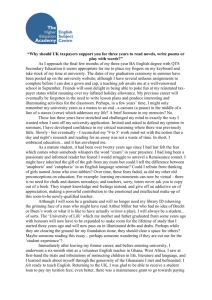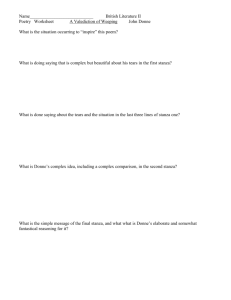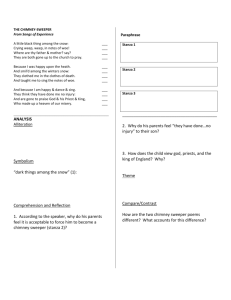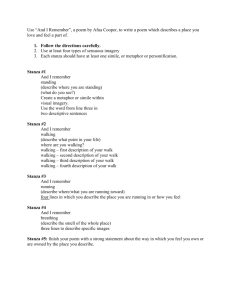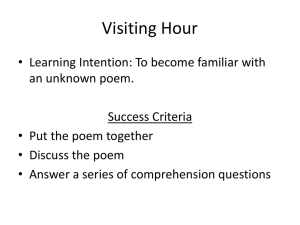registers - Buckinghamshire UTC
advertisement
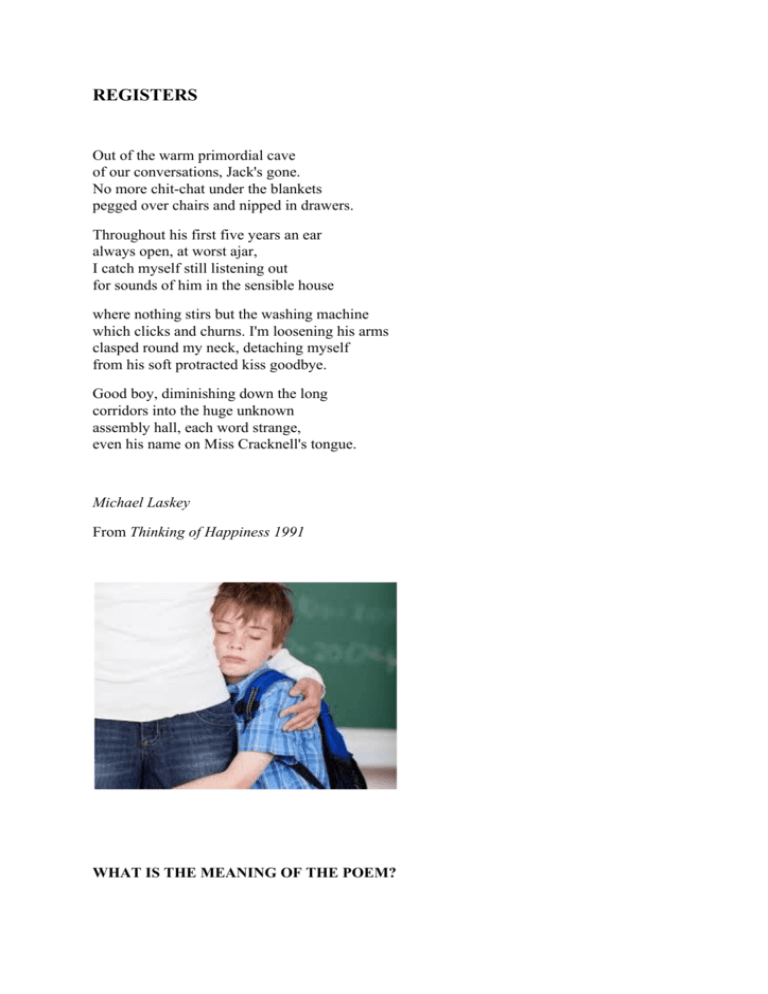
REGISTERS Out of the warm primordial cave of our conversations, Jack's gone. No more chit­chat under the blankets pegged over chairs and nipped in drawers. Throughout his first five years an ear always open, at worst ajar, I catch myself still listening out for sounds of him in the sensible house where nothing stirs but the washing machine which clicks and churns. I'm loosening his arms clasped round my neck, detaching myself from his soft protracted kiss goodbye. Good boy, diminishing down the long corridors into the huge unknown assembly hall, each word strange, even his name on Miss Cracknell's tongue. Michael Laskey From Thinking of Happiness 1991 WHAT IS THE MEANING OF THE POEM? Married to a GP, Michael Laskey was also the main carer for the couple’s three sons in their pre­school years, an experience which possibly finds its way into this poem. Michael Laskey This poem is about his son leaving home for school when just five years old. It talks about the poet’s feelings at his young son’s departure and he misses him. In the first stanza, he talks about the games he and his child Jack used to play when he rigged up a tent using a blanket, thrown over chairs in the house and tucked into drawers. Sitting under this make­believe tent they used to have their chat sessions . In the second stanza, The poet used to always keep one ear open for sounds of the boy but now the house is devoid of a child’s sounds and is ‘sensible’ without the child. In the third stanza, he mentions the only movement is that of the washing machine which ‘clicks’ and ‘churns’. The poet then remembers the boy’s protracted goodbye kiss when he threw his arms around his neck. In the final stanza, when he reaches the school, he walks down the long corridor to the school hall, growing smaller as he walked away. Everything was strange for him, even the way his name was called by Miss Cracknell, the teacher, when she was taking the ‘register’. The formality of the register contrasts with the informal ‘chit­chat’ at home. WHAT ARE THE MAIN IDEAS AND THEMES? ­The sorrow of saying goodbye to a child when he first goes to school ­How a house can change when a child is not there ­The strangeness of a first school: home v school WHAT ARE THE ASPECTS OF STYLE WHICH ARE EFFECTIVE? ● The voice is a sad, melancholy tone of a parent. ● There are contrasts in language between the childhood at home ‘chit­chat’, ‘pegged over chairs’ and ‘nipped in drawers’. This is a warm and nurturing domesticity. The language then changes to starker words ‘long corridors’,’ ‘assembly hall’ and the formality of ‘Miss Cracknell’s tongue’. The child is ‘diminishing’ which suggests the school dwarfs him in its size and ‘long corridors’ sound frightening ● The language is ordinary, everyday language. ● Metaphors include their ‘primordial cave’ (their make­believe tent) which suggests something basic and protective. This is contrasted with ‘the washing machine’, an everyday piece of domestic machinery but here sounding harsh, mechanical and empty as the child leaves home for school. It is contrasted with the emotional richness of the ‘soft, protracted kiss goodbye’. ● There are a lot of conflicting emotions in the words ‘Good boy’ which begin the final stanza.
